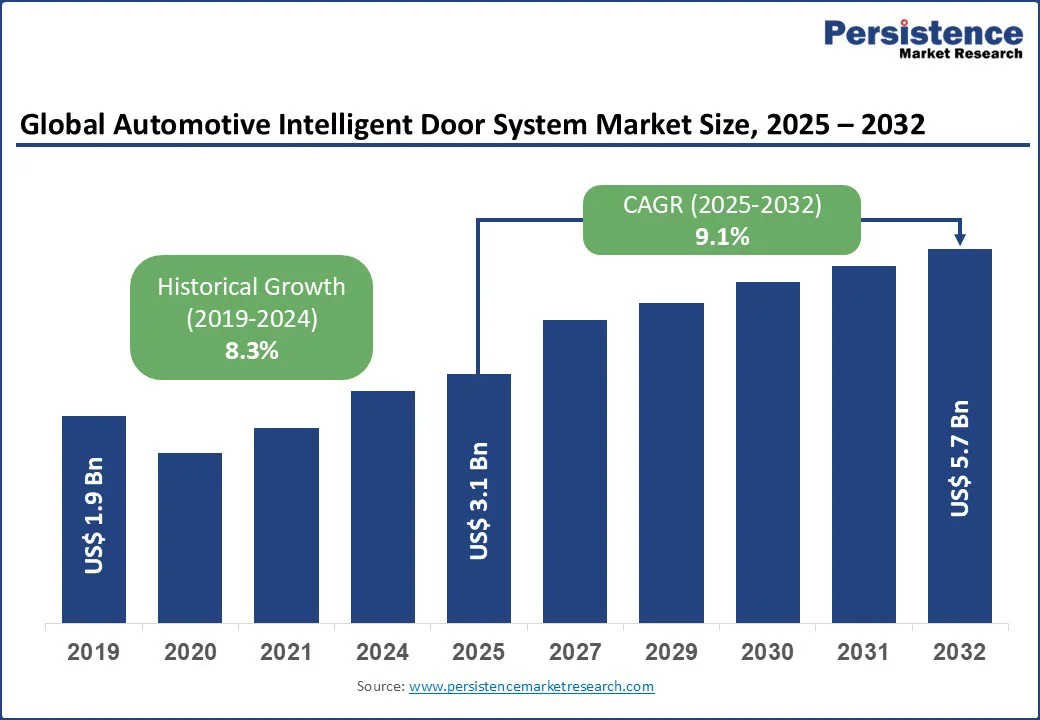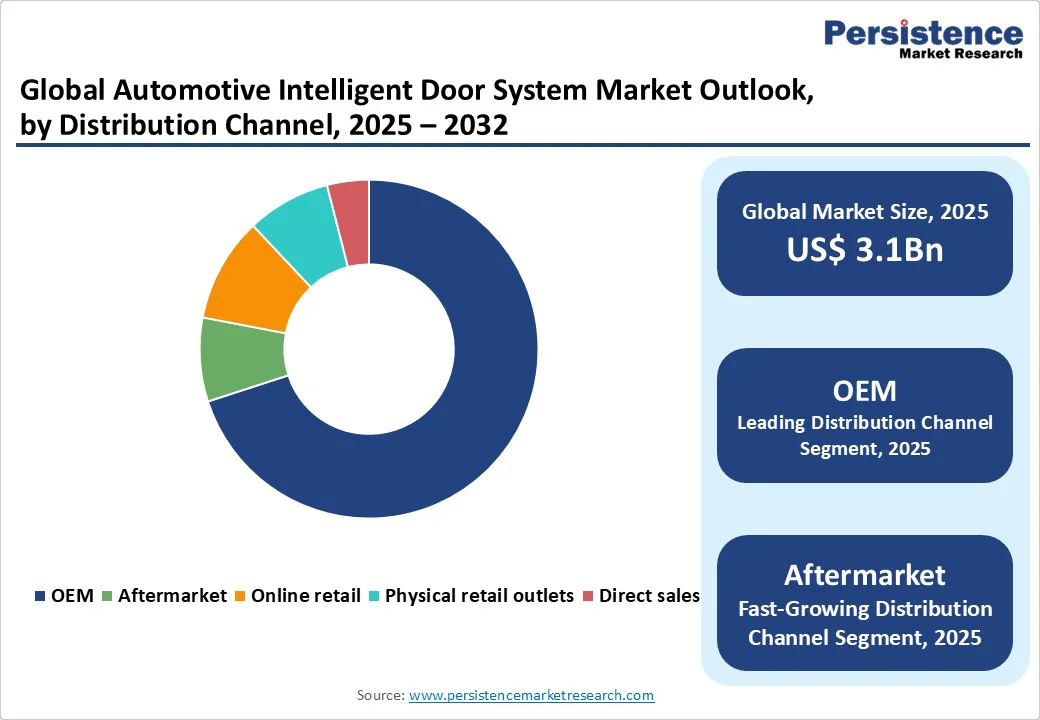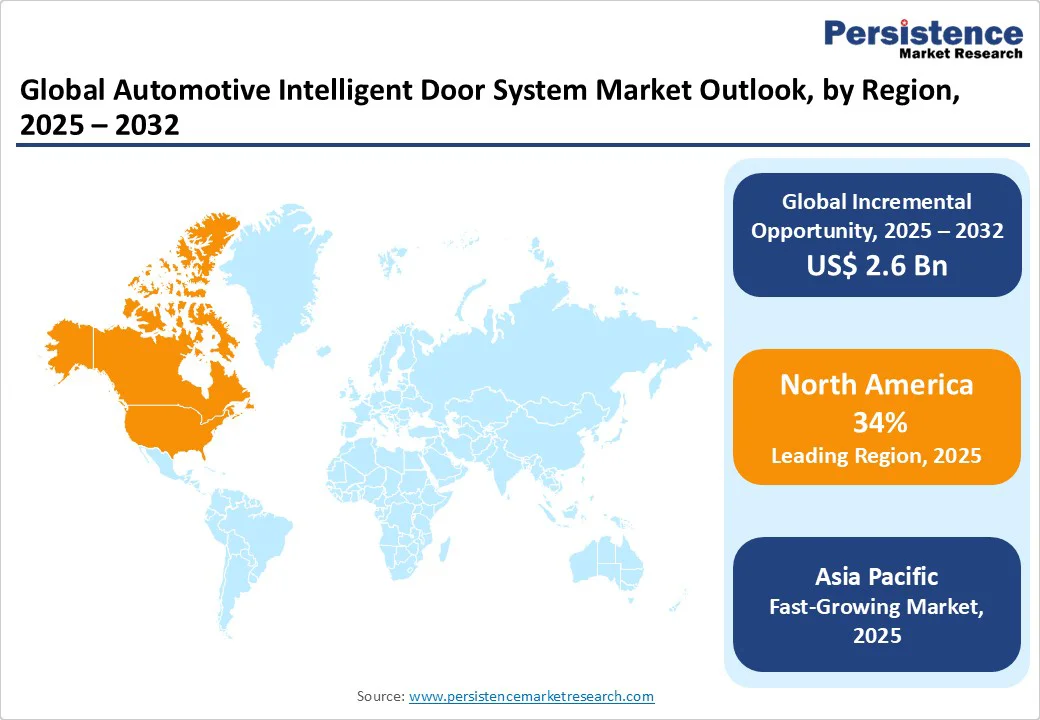ID: PMRREP26059| 188 Pages | 26 Sep 2025 | Format: PDF, Excel, PPT* | Automotive & Transportation

The global automotive intelligent door system market size is likely to be valued at US$3.1 Bn in 2025 and expected to reach US$5.7 Bn by 2032, registering a CAGR of 9.1% during the forecast period from 2025 to 2032.
The industry has experienced robust growth, driven by the rising demand for enhanced vehicle convenience, advancements in sensor and automation technologies, and the increasing need for safety and luxury features.
| Key Insights | Details |
|---|---|
| Automotive Intelligent Door System Market Size (2025E) | US$3.1 Bn |
| Market Value Forecast (2032F) | US$5.7 Bn |
| Projected Growth (CAGR 2025 to 2032) | 9.1% |
| Historical Market Growth (CAGR 2019 to 2024) | 8.3% |

The global surge in demand for vehicle convenience and safety enhancements is a primary driver of the automotive intelligent door system market. According to the International Organization of Motor Vehicle Manufacturers (OICA) and global automotive reports, vehicle sales must increase significantly to meet rising consumer preferences for smart features, with intelligent door systems playing a critical role in providing hands-free access, automatic locking, and collision avoidance.
The rising demand, particularly in regions with high awareness of urban mobility challenges and safety standards, underscores the need for effective automotive intelligent door systems, which offer essential sensor-based detection, seamless integration with keyless entry, and anti-pinch protection for enhanced user experience and reduced accident risks.
The luxury vehicle industry is increasingly adopting automated door mechanisms, where they offer gesture-controlled opening and soft-close functionalities, driving formulation innovations. Consumers are showing a clear preference for premium over basic access systems in sedans and SUVs, prioritizing intelligent features for daily convenience. Automotive applications benefit from intelligent door systems’ compatibility with ADAS, with growing recognition of their role in improving pedestrian safety and vehicle security, leading to steady growth in OEM integrations.
The industry encounters notable restraints primarily due to the high costs of production and resource dependence. Since intelligent door systems are largely composed of electronic actuators and sensors, their availability remains seasonal and heavily influenced by fluctuations in semiconductor supply chains, resulting in inconsistent supply and unstable pricing. This dependency creates challenges for manufacturers seeking reliable, large-scale sourcing.
Furthermore, advanced integration techniques such as software calibration and wireless connectivity require specialized infrastructure and skilled professionals, adding to operational costs and creating barriers for smaller players with limited resources. These factors collectively restrict the ability of emerging companies to enter the sector.
The automotive intelligent door system market is witnessing strong opportunities driven by advancements in EV-compatible technologies and its growing versatility across multiple vehicle types. The adoption of eco-friendly methods, such as battery-efficient actuators and recyclable materials, not only reduces environmental impact but also enhances functionality and efficiency, making the production process more sustainable and cost-effective in the long run. These innovations are particularly valuable as consumer demand increasingly favors products that align with electrification and smart city trends.
Beyond traditional applications in passenger cars and luxury segments, it is gaining traction in emerging sectors. In commercial vehicles, it is being explored for fleet management formulations, where its access control properties contribute to operational efficiency and security.
Additionally, the incorporation of automotive intelligent door systems in electric and autonomous vehicle designs, including biometric unlocking and adaptive handles, offers manufacturers an avenue to differentiate and meet rising tech-savvy consumer preferences.
Expanding market reach into untapped regions such as Latin America and the Middle East further amplifies growth prospects, providing companies with significant opportunities to diversify revenue streams and strengthen global presence.
The automotive intelligent door system market is segmented into power sliding door system, retractable door handle system, and soft close door system. Retractable door handle system accounts for nearly 50% of market share in 2025, driven by its cost-effectiveness, aerodynamic advantages for industrial applications, and broad acceptance across luxury and EV models.
Soft close door system represents the fastest-growing segment, fueled by rising consumer preference for premium, quiet operations and sustainable products. Its expanding adoption in SUVs and commercial vehicles highlights the shift toward user-centric and high-end convenience solutions.
The automotive intelligent door system market is segmented into passenger cars, commercial vehicles, electric vehicles (EVs), luxury cars, and sport utility vehicles (SUVs). Passenger cars lead with nearly 60% of market share in 2025, attributed to its superior volume in consumer markets, cost-efficient integrations, and flexibility in feature enhancements, making it highly suitable for urban commuters and families.
Electric vehicles (EVs) are the fastest-growing segment, supported by their compatibility benefits in smart mobility and battery optimization needs. Increasing demand for seamless access in electrified fleets further drives adoption, positioning EV systems as a key growth contributor.
The global automotive intelligent door system market is segmented into OEM, aftermarket, online retail, physical retail outlets, and direct sales. OEM leads with a 70% share in 2025, holding the largest share due to its widespread integration in vehicle manufacturing, ensuring reliability, advanced features, and strong partnerships with leading automakers.
The aftermarket segment is witnessing the fastest growth in the automotive intelligent door system market, fueled by increasing consumer demand for retrofitting solutions. Its appeal lies in flexible customization, diverse upgrade options, and premium enhancements, making it a favored choice for extending vehicle functionality and convenience.

North America dominates the global automotive intelligent door system market, expected to account for 34% of market share in 2025. The region’s strong market presence is fueled by high levels of luxury vehicle adoption and continuous innovation in smart access products. In the U.S., demand is particularly strong within passenger cars, where it is widely used for its convenience and security benefits. Rising concerns over urban parking challenges and pedestrian safety further strengthen the adoption of intelligent door systems in daily use.
A notable trend shaping the sector is the shift toward gesture and app-controlled systems, reinforced by regulatory support that emphasizes the use of advanced safety features. Retail collaborations with leading auto dealers and online platforms have also enhanced accessibility for consumers, contributing to broader adoption. Canada complements this growth by demonstrating increasing interest in EV integrations and commercial upgrades, further solidifying North America’s position as a leader in the global market.
Europe maintains a significant position in the automotive intelligent door system market, with Germany, France, and Italy emerging as the primary contributors to regional growth. Germany leads the industry, supported by its extensive automotive production, which ensures consistent raw material availability from the country’s robust OEM industry. This advantage has enabled Germany to drive innovation in retractable and soft close applications, while also aligning with the European Union’s strong emphasis on safety standards and sustainable mobility.
France follows closely, with rising consumer interest in luxury personalization strengthening the industry for power sliding and handle systems. The country’s growing demand for urban-friendly vehicles further supports its position as a key growth hub. Italy contributes significantly as well, with multi-application use of intelligent doors across SUV and commercial categories. The country’s focus on design aesthetics and user experience drives adoption and highlights its role in the regional market landscape.
Asia Pacific represents the fastest-growing region in the automotive intelligent door system market, with China, India, and Japan emerging as the primary growth drivers. China plays a leading role, supported by its extensive production capacities and rapidly expanding middle-class population that is increasingly investing in premium convenience products. The country’s strong EV and luxury sectors provide a fertile ground for the use of intelligent door systems in sedans and SUVs. India is also witnessing significant growth, fueled by rising consumer awareness of safety and ease-of-use features.
The integration of intelligent doors into affordable and high-end formulations is further accelerating its adoption. Japan contributes substantially to regional growth through its well-established automotive sector, where the country’s tech-savvy consumers are driving demand for advanced retractable and soft close systems. The strong emphasis on precision engineering and smart features in Japan positions intelligent doors as a key ingredient in innovative vehicle designs.

The global automotive intelligent door system market is highly competitive, with global and regional players striving for an advantage through product innovation, sustainable practices, and cost efficiency. The growing emphasis on multi-technology integrations and compliance with strict regulations further drives rivalry. Strategic mergers, partnerships, and timely regulatory approvals serve as crucial differentiators, enabling companies to strengthen market presence and expand applications.
The automotive intelligent door system market is projected to reach US$3.1 Bn in 2025.
Rising demand for convenience, technological advancements in sensors, and safety regulations are key drivers.
The automotive intelligent door system market is poised to witness a CAGR of 9.1% from 2025 to 2032.
Innovations in EV compatibility and multi-vehicle applications present significant growth opportunities.
Brose Fahrzeugteile GmbH & Co. KG, Continental AG, and Huf Hülsbeck & Fürst GmbH & Co. KG are among the leading players.
| Report Attribute | Details |
|---|---|
| Historical Data/Actuals | 2019 - 2024 |
| Forecast Period | 2025 - 2032 |
| Market Analysis | Value: US$ Bn Volume: As Applicable |
| Geographical Coverage |
|
| Segmental Coverage |
|
| Competitive Analysis |
|
| Report Highlights |
|
By Technology Type
By Vehicle
By Distribution Channel
By Region
Delivery Timelines
For more information on this report and its delivery timelines please get in touch with our sales team.
About Author